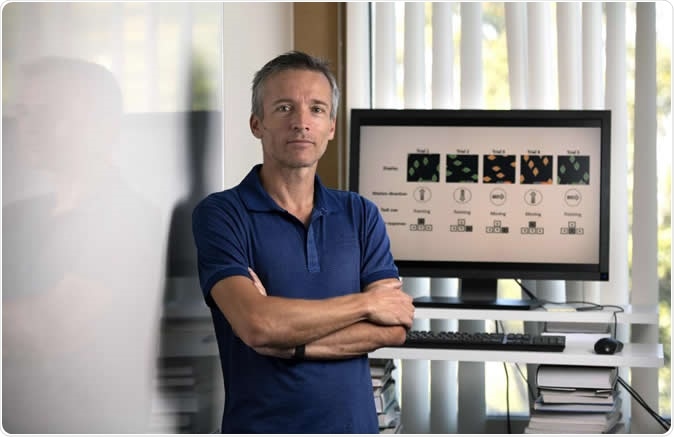Researchers from the University of California Irvine, have found that spending time playing online brain game exercises could be beneficial for septuagenarians and octogenarians in terms of their cognitive abilities. In fact playing these games, the participants in their 70’s and 80’s had cognitive abilities similar to those in their 20s and 30s write the researchers. The study titled, “A large-scale analysis of task switching practice effects across the lifespan” was published in the latest issue of the journal Proceedings of the National Academy of Sciences.

"The brain is not a muscle, but like our bodies, if we work out and train it, we can improve our mental performance," says the study's lead author, Mark Steyvers, a UCI professor of cognitive sciences. Image Credit: Steve Zylius, UCI
Mark Steyvers, a UCI professor of cognitive sciences, and lead author of the study explained, “The brain is not a muscle, but like our bodies, if we work out and train it, we can improve our mental performance. We discovered that people in the upper age ranges who completed specific training tasks were able to beef up their brain's ability to switch between tasks in the game at a level similar to untrained 20- and 30-year-olds.”
The authors wrote introducing their study, “In modern life, we engage with many sources of information concurrently. To do this, we must continuously switch between different tasks, but this comes at a cost to performance, especially in older adults.”
The team of researchers partnered with Lumosity, an online platform that provides a variety of brain training games. One of the games includes the “Ebb and Flow”. In this there is a task switching between cognitive processes and interpretation of shapes and movement. From the millions of players of this game, the researchers included around 1000 users for their study. These individuals were grouped into two – those between ages 21 and 80 years who had completed less than 60 training sessions with the game and those between 71 to 80 years age range who had completed at least 1000 sessions of the game.
Results revealed that the older players who had played frequently could match or even exceed the performances of younger adults who had not had much experience in playing the games. After the 20 to 30 year olds were given 10 practice sessions however, they caught up with the older participants in terms of cognitive abilities and multi-tasking found the researchers.
The authors wrote in conclusion, “While long-term practice improves performance across all age groups, it has a greater effect on older adults. Indeed, extensive task practice can make older individuals functionally similar to less-practiced younger individuals, especially for cognitive measures that focus on the rate at which task-relevant information becomes available.”
Steyvers said, “Medical advances and improved lifestyles are allowing us to live longer. It's important to factor brain health into that equation. We show that with consistent upkeep, cognitive youth can be retained well into our golden years.”
Related study
This is not the first study to look at the benefits of gaming on cognitive functions of elderly. Early this year researchers Suwicha Jirayucharoensak and colleagues from Neural Signal Processing Research Team, Artificial Intelligence Research Unit, National Electronics and Computer Technology Center, Thailand, studied the effects of gaming based training on cognitive performance of elderly.
The study titled, “A game-based neurofeedback training system to enhance cognitive performance in healthy elderly subjects and in patients with amnestic mild cognitive impairment,” was published in February this year in Clinical Intervention Aging.
The team tried the effectiveness of a “game-based neurofeedback training (NFT) system” in a population of elderly subjects who were otherwise healthy but were diagnosed with amnestic mild cognitive impairment (aMCI). For the NFT system the participants were given five games that were designed in a way to enhance the cognitive performance and attention spans.
A total of 65 women with aMCI were recruited for the study along with 54 healthy elderly women. In the study group 58 women were administered normal care along with NFT. They were given “20 sessions of 30 minutes each, 2–3 sessions per week.” For 36 women usual care was given along with “exergame-based training.” For the rest of the 25 participants, normal care was given. Both before and after the treatment the women were administered the Cambridge Neuropsychological Test Automated Battery to assess their cognitive performance.
Results revealed that NFT helped in several aspects of cognitive performance including, “rapid visual processing and spatial working memory (SWM), including strategy.” The researchers explained that women who had been diagnosed with aMCI had scored low in SWM, strategy, memory, pattern recognition and delay in matching samples at the start of the study before the NFT intervention.
The researchers concluded, “NFT improves sustained attention and SWM.” However they added, “NFT had no significant effect on pattern recognition memory and short-term visual memory, which are the other hallmarks of aMCI.” They wrote, “The NFT system used here may selectively improve sustained attention, strategy, and executive functions, but not other cognitive impairments, which characterize aMCI in women.”
Journal reference:
A large-scale analysis of task switching practice effects across the lifespan, Mark Steyvers, Guy E. Hawkins, Frini Karayanidis, Scott D. Brown, Proceedings of the National Academy of Sciences Aug 2019, 201906788; DOI: 10.1073/pnas.1906788116, https://www.pnas.org/content/early/2019/08/13/1906788116